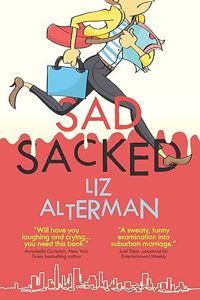
I was given an advance reader copy of this book through BookSirens. This post is an edited version of the Goodreads review I posted. If you care about spoilers for non-fiction books, this review contains a discussion of the ending.
Also a warning for discussion of interpersonal antisemitism, which I did not include in the original Goodreads review.
Sad Sacked is a humorous and vividly-written exploration of a U.S. middle-class suburban family’s brush with financial insecurity when the author’s husband Rich loses his job and the family lives for a year on his severance package. The whole time the author scrambles to keep everything together, taking on crappy writing jobs to pay the bills while trying to motivate Rich to get a new job.
I sympathized deeply with the author’s growing anxiety and frustration as the shadow of her husband’s unemployment grew longer and financial apocalypse loomed, all the while squeezed by the pressure to keep up with the Jones in her affluent New Jersey neighborhood. It’s both an intimate portrayal of one family’s struggle and a dark look into the evaporation of employment and financial security even for the more affluent classes of U.S. society and elsewhere.
That said, I found the narrative ultimately limited by a seeming inability to think outside the status quo. (This is solely based on what was in the book, of course, since no doubt a lot more took place in real life than could be written about.) I found myself annoyed by the author and her husband’s seeming unwillingness to communicate about what seemed like conflicting goals and wants. The possibility of moving to a less expensive neighborhood is brought up but never seriously discussed or planned for in the narrative of the book, even though Rich drags his feet on looking for a new job for half a year. It’s mentioned from the start that he’s unhappy and disenchanted with his job, yet this appears to be dismissed as unimportant in the overriding quest to keep the family in their current lifestyle and neighborhood.
This unwillingness to communicate builds up resentments and ugly fights between the couple as pressures and anxieties mount, culminating in an antisemitic moment over the holidays when the author tells her husband that Christmas—a holiday he had been celebrating with her and their three children all their marriage and possibly before—isn’t his holiday.
It felt weird because there’s no self-reflection in the book about making such a hurtful and exclusionary comment, or a serious apology from what I could tell. It’s even more surreal because the very next scene is of their neighbor making a comment stereotyping Jewish people and the author, while recognizing the bigotry, doesn’t push back against it. So what I get out of what Liz Alterman has chosen to present in her own memoir, leaving aside the complexities of real life that I’m not privy to, is that she gets bigoted toward her own husband when she’s angry enough, doesn’t apologize for it, and also doesn’t defend him when others are bigoted against him. That was certainly a choice.
Moving on to the ending: I usually wouldn’t discuss endings in a review of a book that has a narrative, even non-fiction, but it’s a big chunk of what spoiled (heh) the book for me so I figured I’d go into it. Spoiler alert, the husband does get a new and higher-paying job at the last minute as his severance runs out. The family get to keep the house and go on as before. Yay, all’s well that ends well, right?
Unfortunately it rang hollow for me, because the only thing the couple seems to have learned from this time in their life is that they need to be grateful, not take anything for granted, and work hard. Evidently it doesn’t matter that the husband was miserable working in this field. No, he should be grateful to have a job at all and he’s learned his lesson! Don’t even think about the possibility of a new career/lifestyle or stepping off the light-speed social prestige treadmill, just keep your head down, say yes sir and yes ma’am, and keep working!
The final chapter/epilogue where the author states these lessons felt creepily docile and saccharine, so unlike the verve and humor that had attracted me to the book in the first place. Maybe that’s appropriate for an ending that may read on the surface as happy but is actually one of accepting the status quo and learning to comply with it. This lack of imagination, this beaten-down acquiescence to social pressure, may be the most sadsack thing about Sad Sacked.